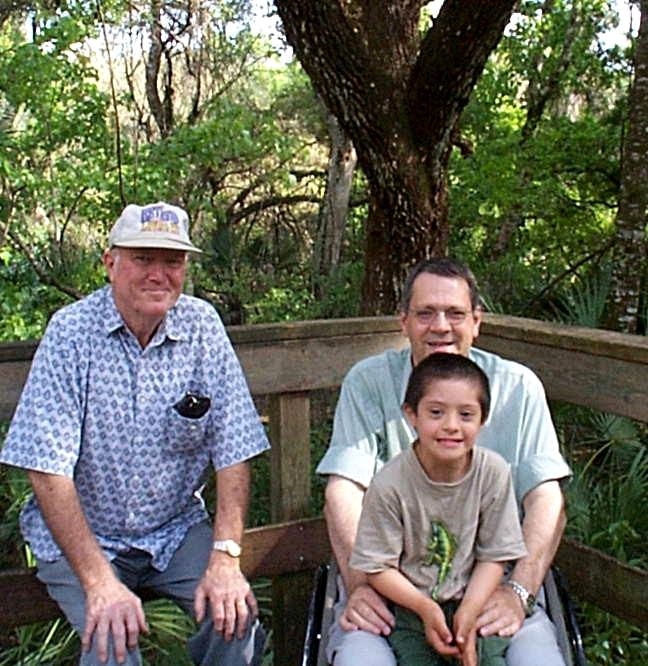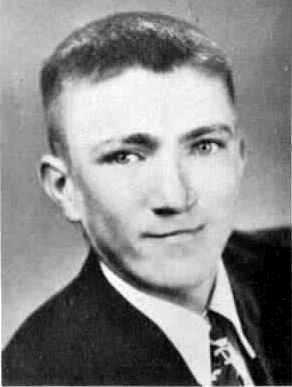

My father, Robert Orien Bodine, was born on July 21, 1933 at the house on the Green River that was built in about 1931. The other house had burnt about the time that James Robert Bodine and his wife died. Grandma said the name Robert came from my dad's grandfather, James Robert, and Orien came from the name of one of Granddad's (Charles Sharp Bodine) friends.
Because of his health problems, Dad went straight off to the Children's Hospital in Louisville, KY. He was at the hospital for eight or nine years before moving back to the farm. Dad doesn't remember much from that time except a couple of Christmas parties. Instead of going right back home when he was let out of the hospital, he first went to live at Rex and Edith Forgy's home. Edith was his mom's sister. They didn't have children back then and the doctors were afraid that Dad might catch something from his siblings at the farm. He's not sure how long he stayed there before finally moving back home to the farm on the Green River.
Dad took three grades at Sunnyside School the first year he was in school, but he really doesn't remember his first days there. The only teacher he remembers ever having at Sunnside was Mr. Bailey from Calhoun, KY. Dad graduated from the 8th Grade in 1947. There were four people (just boys) in his grade and maybe twenty in the school. Some people Dad remembers from school were Charles Bullock, Phillip White, and Junior Posey. They graduated with Dad. Also Emily, Suzy, Nancy, and Ellen went there at the same time. There were also some Casieberys, Byers, Olivers, Hendricks, Hensons, Sharps, Fulkersons, Cartwrights (they lived on the big hill), Butlers, Fogleys and Danks who attended. Dad and his sisters used to walk through the woods to school. It was about a mile and a half from their house. School was from around 8 AM to 3 PM. Sunnyside School was on what is now called Sunnyside Road. I have a map in my stuff where this school is marked.
The school had a big blackboard and a pot-bellied stove. There was a spring down the hill. Someone would get a bucket of water and everyone drank out of the same dipper from that bucket. Everyone did their own assignments at their desks. They had a flat spot between the field and the outhouses where they played baseball with a rubber ball so nobody would get hurt. They played during lunch, but during recess there wasn't enough time except to use the outhouses. Dad's sister, Suzy, got her front tooth broken during a game of kick-the-can. Someone would kick the can and try to hit someone. They had to stay on school property while they played and couldn't cross the street. Mr. Bailey had a big paddle and a switch in the corner to keep order in the class. If things really got out of hand, he'd shut the doors and windows and give someone a good whipping if he needed it. Dad only remembers that happening with one boy. That boy was 21 and still in the first grade. He doesn't think that boy ever returned to school after that.
The school was taken care of by the trustees. Most of them were parents of the students. Grandpa Bodine was one of the trustees. The women cleaned up the inside and the men the outside. Lime was put in the toilets and the grass was cut by hand and the bushes trimmed back. Dad and Grandpa had to clean up the path to the school every year, too.
On the farm, as the only boy among seven sisters, he had lots of outdoor chores to do (the girls did help out, too). They had half a dozen cows, twenty hogs, and a couple hundred chickens. Before he went off to school, he would help Grandpa milk the cows (six or so), feed the livestock, and bring in the coal or wood. After school, they'd feed the pigs, chickens, and other livestock (when needed). They also brought in the water and gathered eggs at night. They got most of their groceries with these eggs and a little milk that they traded to the local store. Using a three-horse and a two-horse plow, they planted about 150 acres every May and June. Around 1949, they bought a tractor to help with this. They also planted a one acre garden where they grew just about anything they needed to eat. Grandma and the girls worked more on this. When dad was eleven or twelve, Granddad got boils and couldn't work much in the field. So dad did almost all the work that year in getting the crops out. Grandpa would hitch up the horses and plow, but Dad would do the rest of the work. His payment was going to be the profit from their popcorn crop and from the sale of corn on some new land they had cleared. Dad was going to buy a bicycle with that money. However, they had a really dry year and the only crop that really came in was the corn on the new land. They needed that money to feed the family. His bicycle had to wait.
In about the winter of 1951, while Dad was out hunting, he saw some ducks in the backwater down the road toward the woods across from the slew. He went after them with his shotgun shooting one and then he went stalking after the other ones that had taken off further into the woods. They kept going deeper and deeper into the woods as he stalked them. Eventually he got close enough to scare them up and shot five more. With six ducks tucked into his belt, he decided it was time to head home. However, after concentrating so much on getting the ducks he hadn't noticed that it was already about dark. He started walking out toward where he thought the road was when it got completely dark. He couldn't see a thing and realized that he was lost. He was thinking that he'd have to spend the night in a tree out there somewhere surrounded by that cold backwater (he was out there walking around in it with his hip boots). He climbed a tree and tried to get settled in it and was also looking to see if he could see a light or something from up there. After a while, he heard their family's flatbed truck rumbling up the road and then saw the headlights in the distance through the trees. It was Suzy and Emily making their way home from work. When he saw the truck make a 90 degree turn on the road, he then knew exactly where he was and began working his way to the road. A little after that, he heard his dad blow in the barrow of his shotgun. This is done by blowing in the far end and holding your finger on where the air comes out the other end. This makes a really loud noise that can be heard for a long distance. Dad heard Grandpa from maybe a mile away. Dad blew back in his shotgun. As Dad made his way out of the woods, he stepped into a ditch near the road and filled his hip boots with cold water. He took off his boots and dumped the water out and walked the rest of the way home along the road. Grandpa said that when it got dark and Dad still wasn't home, he began thinking that he might have gotten lost; so he blew into the barrel of his shotgun. Dad had known about that trick, but said he probably never would have thought of it at the time. Once Grandpa did it, though, he remembered about it. Needless to say, Dad was glad to get home and out of his wet clothes. Everyone was also happy that he had six ducks.
In 1954, while Dad was home from his job at DuPont in Louisville, he went quail hunting while the backwater was up. He and the dog got in the boat and went to the old White place to hunt. He had four or five quail and was still hunting in view of his boat. From the hill where he was, he saw a green coup go up the road toward the house. He'd never seen that green coup around and was wondering who it was. As he kept looking, the car stopped by his boat, a guy jumped out and brazingly stole the motor off his boat. Dad started running toward the road to cut the car off. The guy in the car saw Dad coming and sped up to escape. Dad was about 200 feet away from the road when the car passed him. He let the car have it with three shots from Granddad's 20 gauge, but the car got away. He walked out to Nelson and asked at a store who owned a green coup. The people at the store knew who it was, but they wouldn't say because the guy lived so closeby. A young guy in sthe store said that nobody knew the person, but suggested they "go hunting." After leaving the store, the guy told him that the guy with a green coup lived right near the store. He didn't want to say that in the store since word would get back to the thief about who said what. He told Dad not to tell anyone who told him. Dad went up to the thief's mother's house right there near the store, but this time he didn't say what had happened. He only asked if Johnny was home. She said that he had gone into town. Dad then walked back to the boat and tied up the dog so that he could go into town. He walked another four miles to the main road before someone finally picked him up. He about had blistered feet by that time since he was walking around in rubber hip boots. Nobody else had picked him up since he had his hunting clothes on, a shotgun, and hip boots on. Dad told his story to the guy who picked him up and was let out in Central City. Dad now knew who the thief was and that he had a sister in town. He decided to make his way toward her place. Meanwhile, the guy who picked him up then went to tell the sherrif what had happened. The sheriff was Phillip Stone, Dad's third cousin. He told the sheriff that Dad was on his way to confront the thief and that he had a 20 gauge shotgun. The sherrif then went by and picked Dad up acting like he didn't know anything. He asked him why he was walking around town with a shotgun. When he got the story out of Dad, he then took him to that house. He told Dad to stay in the car and went to talk with the sister. The green coup was parked there outside and had lots of buckshot dents in it. She, Jane, said that her brother was not there. The sherrif wanted to come in and look around, but she didn't want him to. Since she wasn't cooperating, the sherrif said he'd leave Dad there outside with his shotgun while he went to get a warrant. The sister then admitted that her brother was home. They went into the basement of the house and found a motor that looked like Dad's; however, it wasn't the same color. The thief had already painted it with fast-drying paint, but they could tell that even though it was dry it was freshly painted. The sheriff told him they knew it was not his motor and that he had just better give it back to Dad and settle the matter right there. Johnny eventually admitted things and apologized saying he didn't know it was Dad's motor (like it should really matter whose motor it was). The sherrif warned him and let him off after Dad said he didn't want to prosecute.
Another time, Dad and Graddad were going quail hunting up in Lewisburg at his uncle Gibby Goodman's house on a farm out in the boondocks. Gibby was Grandma's brother. Randall Stewart, Dad's brother-in-law, was with them and had the single shot 20 gauge. This was about 1956 or so. Granddad stopped in a store to buy some lunch. He bought some baloney, cheese, and bread. Randall asked Grandpa what he bought. After Grandpa told him, he said he didn't like any of that stuff. Grandpa just told him that that was all he had bought. After hunting for a while, Randall got tired and said he'd go back to the truck and rest until they finished hunting. So Randall went to the truck and Dad and Grandpa hunted a couple more hours. When they got back to the truck, they discovered that Randall had eaten every single thing they had bought. He didn't even leave a piece of bread for anyone else. Granddad just blew his stack, but Dad thought the whole thing was kind of funny. After getting home later that day, Granddad told everyone, "I'm sure glad I didn't buy anything he did like!"
Dad also told me that the Thanksgiving meal was always quail. Their dog, Old Doc, was a pointer and a really good one. He helped them get a lot of quail. The season opened around the 20th, and they always had enough quail for the meal. They never had enough money to get a turkey for Thanksgiving.
They drove to high school in an old flat bed Chevrolet truck they had. Dad graduated in 1951. Emily and Suzy were validictorians, but Dad deliberately didn't want to be so that he didn't have to make a speech in front of everyone. However, he was voted "best student" and "most likely to succeed" at his high school. He was voted second in the "most friendly" category.
During the last two years of high school and the next year after graduation, Dad worked at J.C. Penny's. He was a stock boy and a sales clerk in the men's department. In 1951, an outfit, Greenville Quarries Inc., began rebuilding the road in front of the farm - redoing the ditches and drainage and everything from a red rock road to a white rock road. For a while, he was working on the road and at Penny's. He was a grade checker, setting stakes and the like. They were working there one Saturday when Dad saw the superintendent Merle out working by the mailbox. He was checking grades. Dad asked him why the superintendent was doing that. He told him he couldn't find anyone to do it right. Dad said it didn't look that hard so Merle showed him how to do it and after Dad did it right a couple of times, he hired him right there on the spot. They shut down during the winter and then did another road out near Hopkinsville the next year. He eventually left the farm toward the end of 1952 and moved to Louisville to take a job at Dupont. He was working there when he met mom. One day, he went to meet a friend at a boarding house. As he was getting close, he happened to follow a certain girl down the street right into the house. (The boarding house was called Mag Manor and was owned and operated by my grandmother, Bertha Kraus. It was the first boarding house she had owned. Grandma Kraus had gotten tired of being a waitress and wanted to try something different.) The girl my dad had happened to follow was my mother, Sandra Jane Cheatham. It was the first time he had ever seen her. He ended up marrying her about a year later on July 4, 1957 in Louisville, Kentucky at the Fourth Avenue United Methodist Church They were married by Brother Matthews. Ellen (Ruck) Bodine was the maid-of-honor and Norman Spratt was the best-man. They went to Kentucky Dam for a weekend honeymoon. (See cassette tape for more details.) Sandra was born on October 18, 1941 in Louisville, Kentucky. She was the second daughter of William Albert and Bertha (Kraus) Cheatham.
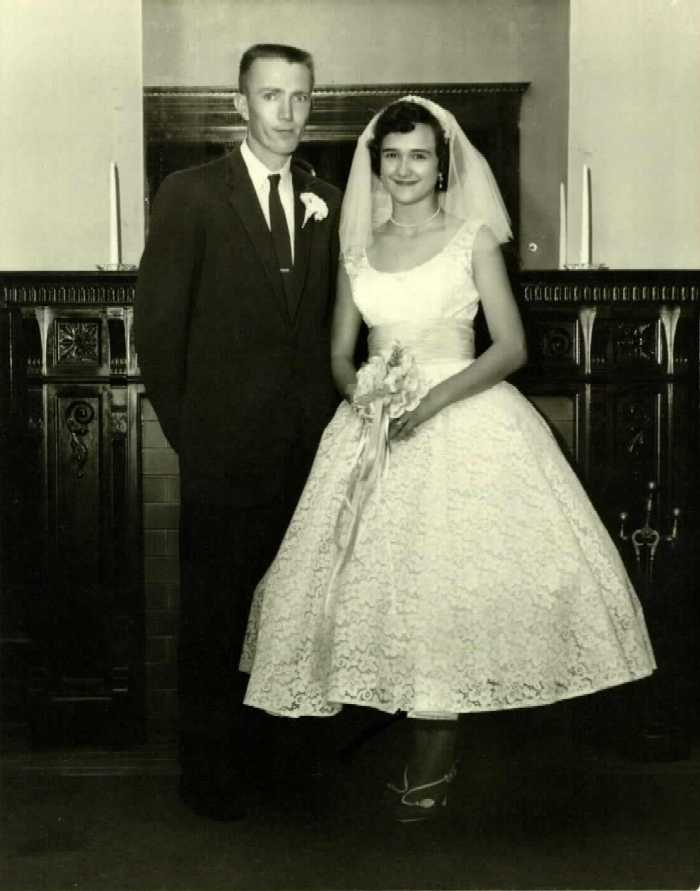
In Louisville, Dad was making over $3 an hour at Dupont. That was a good wage back then. But in October, 1957, just a few months after getting married, the plant was shut down and Dad was laid off. They stayed in Louisville until Christmas before moving back to Central City. Mom enrolled at Muhlenberg Central where she finished out her sophomore year. Carol (Walker) Bodine was in her same grade. Mom was a real "city-slicker" when she went to the farm. She had to learn how to draw water from a well, take a bath out of a pan, and go to an outhouse in the middle of the night (I think she tried to avoid that).
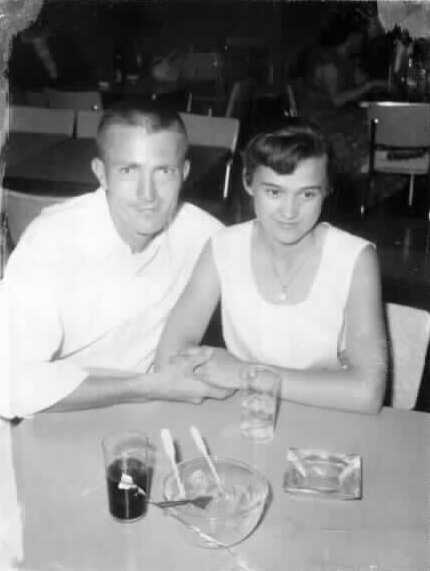
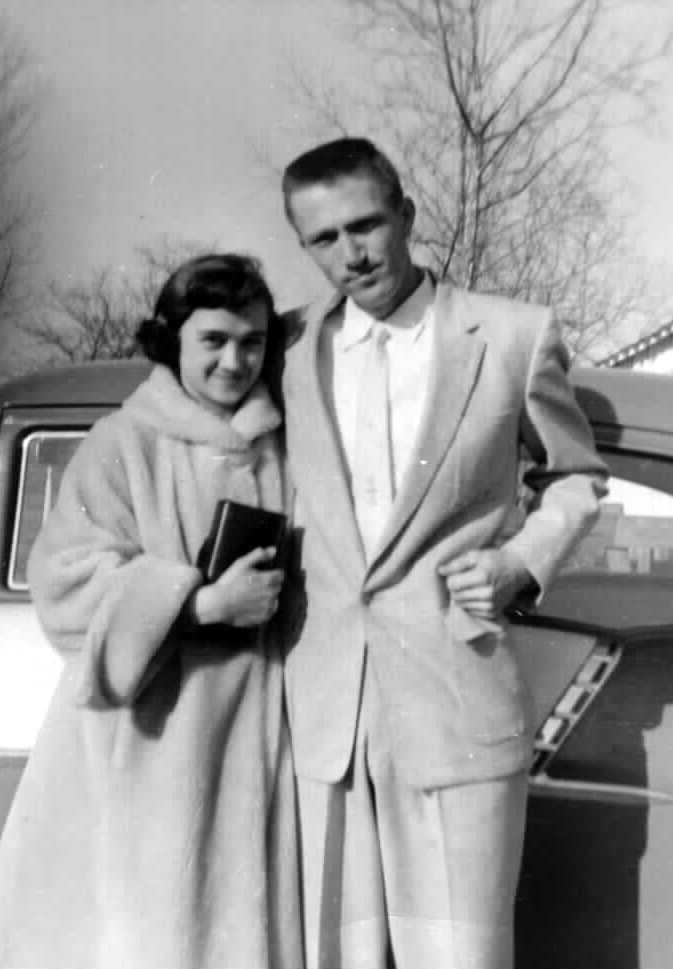
In April of 1958, Dad took a job doing highway construction in Danville, Kentucky. Mom finished out the school year in Central City and joined Dad in June. They lived in a mobile home out on a small campground on a farm. However, they didn't stay in Danville long. Dad was only making a dollar an hour there. After getting a better job offer from Anderson Construction, they moved to Piqua, Ohio in November of 1958. But a foot of snow over Thanksgiving weekend caused that job to shut down for the winter. They then moved their mobile home to a park on Seventh Street in Louisville to wait out the snow. He started back up with Anderson in the spring working on Interstate 75. Pierce Construction then took over the job from Anderson and offered Dad a job as a foreman. About 1964, Dad went to work for Burt Construction out of Maumee, Ohio. One of the half-partners in this company was Norman Busch. Busch formed his own company in 1967 and Dad went to work for him in 1969 after Burt Construction had gone bankrupt. He became one of a number of partners with Norman Busch in 1970. Dad was the general superintendent for this company for many years. The majority of the company's work involved building all kinds of underground pipe systems. They worked on everything from nuclear power plants to local shopping malls. Busch closed this company down in 1985 and paid off his partners. Dad then went to work as superintendent for PHC doing the same kind of work.
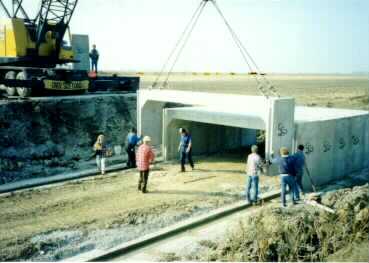
Dad and Mom moved from Piqua, to Findlay, to Toledo. Mom attended various schools during this time. Since she was young and married, she was taken to the principal at each new school and warned not to talk about "married life" with her fellow students. With all this moving, Mom wasn't able to finish high school right away. However, she did finish it at night school in about 1976. My brother, Bob, was born in Piqua in 1960 and I was born in Toledo in 1962. There used to be a trailer park called Shasta across from Franklin Park Mall in Toledo. This is where I was born and my sister, Linda, in 1963. We had a bigger trailer by then, a thirty-five footer. In February of 1964, we moved out to a house in Lambertville, Michigan, a suburb of Toledo. Brenda, my second sister, was born in 1971 at our second house in Lambertville. [Bob (Robert Charles) was named after my father and my grandfather. I was named after David from the Bible and the movie star Alan Ladd whom my mom liked. Linda was a name my mom liked. Her middle name, Jane, was for my mom (Sandra Jane) and my father's mom, Mary Jane. Brenda's name was chosen because it sounded like Linda and it began with a "b" like Bertha, my mom's mom. Marie, her middle name, was for Mary from the Bible.]
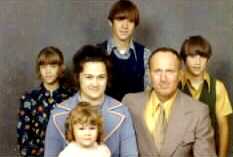
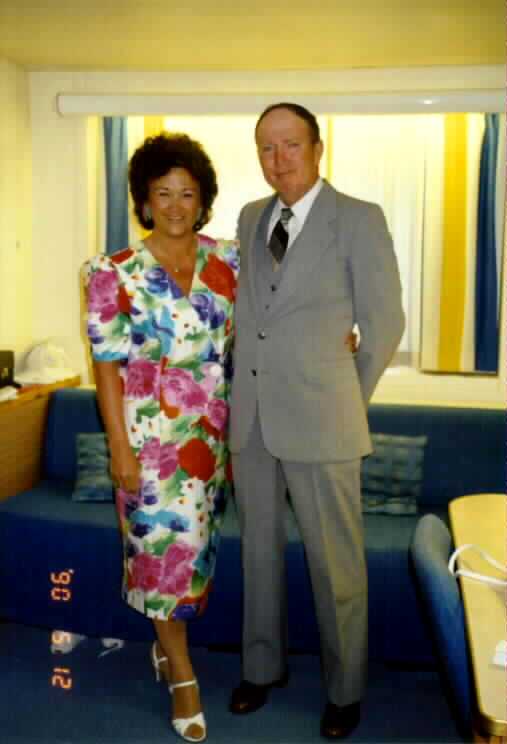
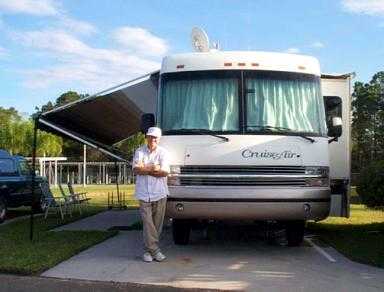
Here below is a picture of Dad, his son Robert, and his grandson Ian.
